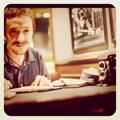Nobody reviewed Piranèse by Susanna Clarke
Piranèse
3 stars
L'histoire est originale, mais elle aurait mieux convenu à une nouvelle. Là, étirée sur 300 pages, ça traine en longueur, et le livre a fini par me faire l'effet d'être aussi vide et interminable que les pièces parcourues par le personnage principal.
L'histoire est originale, mais elle aurait mieux convenu à une nouvelle. Là, étirée sur 300 pages, ça traine en longueur, et le livre a fini par me faire l'effet d'être aussi vide et interminable que les pièces parcourues par le personnage principal.








